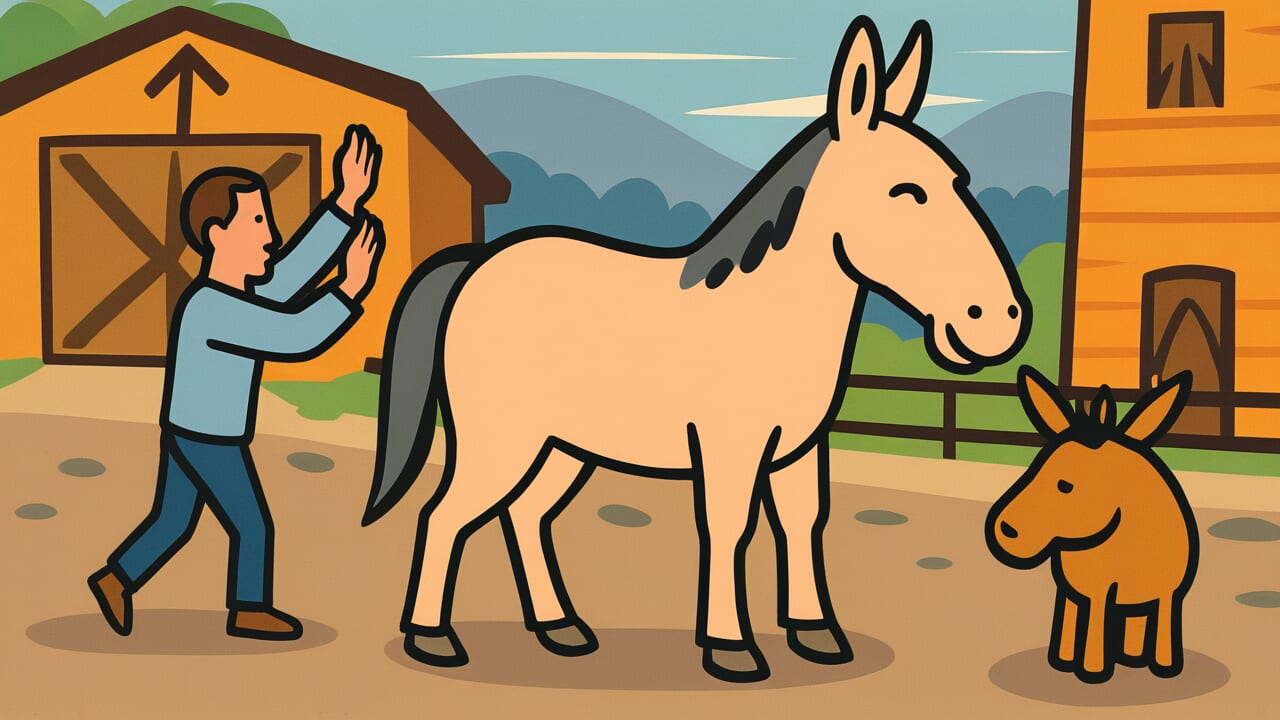How to Read “An ass may bray at a good horse”
An ass may bray at a good horse
[an ASS may BRAY at a good HORSE]
“Bray” means the loud cry that donkeys make.
Meaning of “An ass may bray at a good horse”
Simply put, this proverb means that people of lesser ability or character may still criticize those who are clearly better than them.
The saying uses farm animals to make its point. An ass is another word for donkey. A good horse represents something valuable and superior. When a donkey brays loudly at a fine horse, it doesn’t change the horse’s worth. The noise just shows the donkey’s nature.
This wisdom applies when less skilled people criticize experts. It happens when jealous coworkers attack successful colleagues. You might see it when failing students mock honor roll classmates. The criticism says more about the critic than the target. Quality speaks for itself, regardless of who complains about it.
What makes this saying powerful is its simple truth about human nature. People often feel threatened by excellence in others. Rather than improve themselves, some choose to tear others down. The proverb reminds us that not all criticism deserves attention. Sometimes the source matters more than the words.
Origin and Etymology
The exact origin of this proverb is unknown, though it appears in various forms across European languages. Early versions can be traced to collections of folk wisdom from several centuries ago. The saying reflects agricultural societies where people worked closely with horses and donkeys.
During medieval times, the difference between horses and donkeys was significant. Horses were valuable animals used for war, transportation, and heavy work. Donkeys were cheaper, stubborn, and considered less noble. This social understanding made the comparison immediately clear to listeners. The contrast helped people remember the lesson.
Folk sayings like this one spread through oral tradition before appearing in written collections. Traveling merchants, storytellers, and common workers shared these bits of wisdom. Over time, the saying crossed language barriers and cultural boundaries. It survived because the human behavior it describes remains constant across different societies and time periods.
Interesting Facts
The word “bray” comes from Old French and specifically describes the harsh cry of a donkey. Unlike other animal sounds, braying has always carried negative associations in English. The loud, unpleasant noise became a symbol for foolish or annoying speech.
This proverb uses a literary technique called juxtaposition, placing opposites side by side for effect. The contrast between the “ass” and “good horse” makes the message stronger than using similar animals would.
Usage Examples
- Coach to player: “Don’t let their trash talk get in your head – an ass may bray at a good horse.”
- Manager to employee: “The new hire keeps criticizing your work, but we know your track record – an ass may bray at a good horse.”
Universal Wisdom
This proverb reveals a fundamental tension in human social dynamics. When people encounter obvious superiority in others, they face an uncomfortable choice. They can either acknowledge the gap and work to improve, or they can attack what they cannot match. The second option requires less effort and protects the ego from painful self-examination.
The psychological roots run deep into our survival instincts. In ancient communities, social status often determined access to resources and mates. Those at the bottom of hierarchies developed strategies to challenge those above them. Direct confrontation was dangerous, but criticism and gossip were safer ways to undermine rivals. This behavior persists even when the original survival pressures no longer exist.
What makes this pattern universal is how it serves multiple psychological needs simultaneously. Criticism allows people to feel temporarily superior without actual achievement. It creates the illusion of being a discerning judge of quality. Most importantly, it shifts focus away from personal shortcomings onto external targets. The behavior becomes self-reinforcing because it provides emotional relief without requiring genuine growth or change.
When AI Hears This
Criticism costs almost nothing while excellence demands everything. Anyone can point out flaws in seconds. Creating something worthwhile takes years of effort. This creates a strange marketplace where cheap complaints compete with expensive achievements. The loudest voices often belong to those who risk the least.
Humans seem wired to give equal weight to all opinions. A master’s quiet wisdom gets drowned out by amateur shouting. This happens because our brains evolved in small groups. Back then, every voice mattered for survival. Now this ancient wiring backfires in our complex world.
What fascinates me is how this “unfair” system actually works perfectly. The constant criticism forces excellence to prove itself repeatedly. Like a muscle that grows stronger under pressure, true quality emerges more refined. The braying serves as quality control, even when it comes from ignorance.
Lessons for Today
Understanding this wisdom begins with recognizing it in action around us. When someone consistently criticizes successful people, look for patterns. Are they offering constructive feedback or just finding fault? Do they have the expertise to make valid judgments? Often, the most vocal critics lack the skills they claim to evaluate in others.
The insight becomes more valuable when we apply it to ourselves. We all face moments when others achieve what we want. The natural response might be to find flaws in their success or methods. This proverb suggests pausing before we speak. Are we offering genuine insight, or are we just uncomfortable with someone else’s achievement? Honest self-reflection can prevent us from becoming the braying donkey.
In groups and organizations, this wisdom helps identify productive versus destructive feedback. Teams benefit when members can distinguish between helpful criticism and jealous noise. Leaders who understand this pattern can better evaluate complaints and suggestions. They learn to consider the source alongside the message. The goal isn’t to dismiss all criticism, but to recognize when criticism reveals more about the critic than the subject. This awareness helps everyone focus energy on actual improvement rather than defensive responses to meaningless noise.



Comments